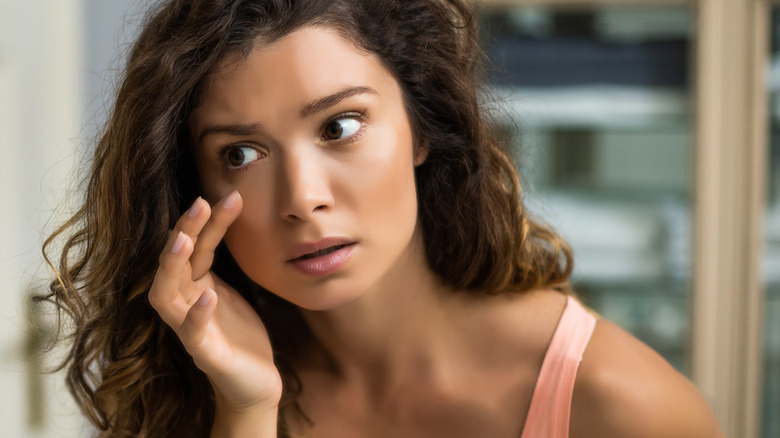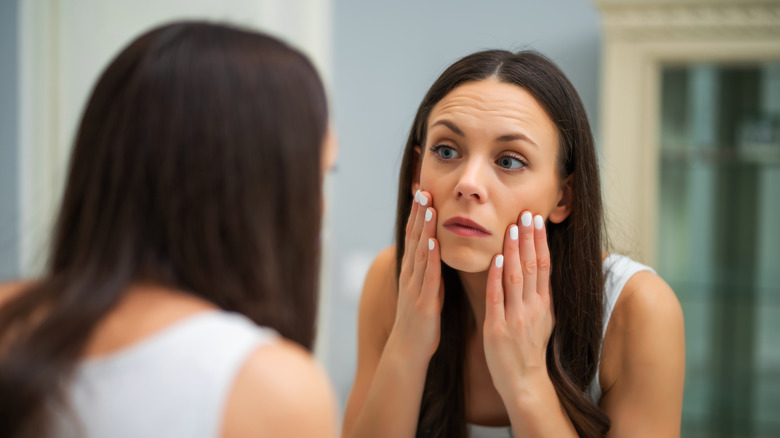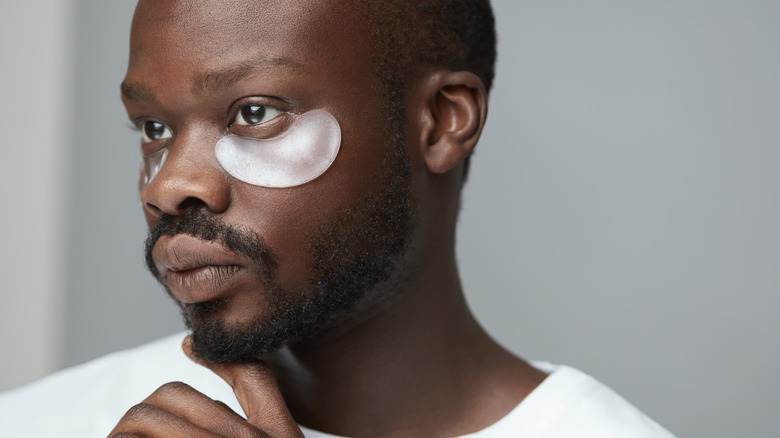This Is What Really Causes Puffy Eyes
Waking up with swollen, puffy eyes can ruin your confidence and keep you from feeling your best. Makeup can help to some extent, but it won't reduce the swelling. On the positive side, puffiness around the eyes is rarely a sign of anything serious. Its causes range from allergies and sleep deprivation to water retention, explains board-certified dermatologist Dr. Corey L. Hartman. "The eyes are areas of highly specialized skin that is vulnerable to several different systems and susceptible to various changes that affect their appearance," she told Byrdie.
Another common cause is aging, says the American Academy of Ophthalmology (AAO). Over time, the skin around your eyes loses its elasticity and begins to sag. Fat and fluid can accumulate in this area, making your eyelids look swollen. Genetics, poor sleep, smoking, and other factors may play a role, too. Sometimes, puffy-appearing eyes can run in families, so there is little you can do to prevent it. Just make sure you see an ophthalmologist if you also experience pain, redness, or itchiness around the eyes, suggests the AAO.
However, if you believe the cause of your puffy eyes is environmental, the first step to remedy it is to figure out the cause. For example, high-sodium foods can cause your body to hold water, leading to edema around the eyes (via the AAO). If that's your case, you may need to cut back on salt and tweak your diet. Other factors, including your lifestyle, can also contribute to this problem.
Other common causes for puffy eyes
While it's normal to have puffy eyes after crying or skimping on sleep, some people experience this problem on most days. A common cause is dehydration, according to dermatologist Arielle Kauvar. "Dehydration can occur with excessive alcohol, caffeinated drinks, too little sleep, dry climate, and poor fluid intake," she explained in an interview with Byrdie. In some cases, medications are to blame. According to a 2007 study in Seminars in Plastic Surgery, acetaminophen, albuterol, aspirin, prednisone, ibuprofen, estrogens, and vasodilators were found to be common culprits of eyelid edema, or puffy eyes. Topical drugs and certain vaccines may have this effect, too.
You may also experience puffy eyes due to an allergic reaction to perfumes, cosmetics, nail polish, or sunscreen. Sometimes, puffiness around the eyes is a symptom of seasonal or perennial allergies. Also, note that eye drops and contact lens solutions may contain preservatives with allergenic potential, according to Seminars in Plastic Surgery.
And don't be surprised if your eyelids become puffy during that time of the month (via Women's Health). When you're on your period, your hormone levels go up and down, which may cause fluid retention — including swelling around the eyes. But what, if anything, can be done to soothe tired and puffy eyes?
These tricks can help you get rid of puffy eyes
Eye puffiness can usually be addressed through lifestyle changes. Simple things, such as cutting back on sodium and getting more shut-eye, may prevent or reduce eyelid swelling and lead to better health. The American Academy of Ophthalmology (AAO) also recommends sleeping with your head slightly elevated to keep fluid from building up in the area around your eyes. Limit your fluid intake at bedtime and try to get seven to nine hours of sleep.
If your eyelids are swollen in the morning, apply a cold compress for a few minutes. You may also use a cold teaspoon, cold tea bags, or ice packs. This trick can also reduce the eye puffiness associated with allergies, explains professor and director of allergy and immunology at the Ohio State University, Princess Ogbogu (via Everyday Health). She also recommends rinsing out your eyes with a bit of water if your symptoms are due to an allergic reaction.
Dermatologist Dr. Chiranjiv Chhabra told Vogue that anti-aging and antioxidant products may help prevent this problem in the first place. She suggests using products rich in vitamin C, vitamin E, and vitamin K to stimulate collagen production and protect the delicate tissues around your eyes from oxidative stress. Facial exercises can reduce puffy eyes, too, says Dr. Chhabra. For example, you could try facial yoga, which consists of simple exercises that may help strengthen and rejuvenate your skin.



